[Trending] This Artist Came Up With A Genius Way To Uses Puzzles
Putting together a Jigsaw puzzle can be delightfully frustrating and Vancouver based artist Tim Klein wants to add in some extra pieces. Ye...
Putting together a Jigsaw puzzle can be delightfully frustrating and Vancouver based artist Tim Klein wants to add in some extra pieces. Yes, Klein practices the obscure art of ‘puzzle montage,’ taking pieces from various jigsaw puzzle sets and re-arranging them to form a new stunning image.
This puzzle montage practitioner said he was inspired by a 1988 magazine article he read on, whom he credits as, the ‘pioneer’ of the art form, Mel Andringa.
So how does it work? “Jigsaw puzzle companies tend to use the same cut patterns for multiple puzzles. This makes the pieces interchangeable. As a result, I sometimes find that I can combine portions from two or more puzzles to make a surreal picture that the publisher never imagined,” explained Klein.
While for some this sounds like an impossible undertaking, for this artist it is an adventure: “I take great pleasure in “discovering” such bizarre images lying latent, sometimes for decades, within the pieces of ordinary mass-produced puzzles. As I shift the pieces back and forth, trying different combinations, I feel like an archaeologist unearthing a hidden artifact.”
Scroll down below to see some of Klein’s masterful puzzle montage art!
Mountain Plantation
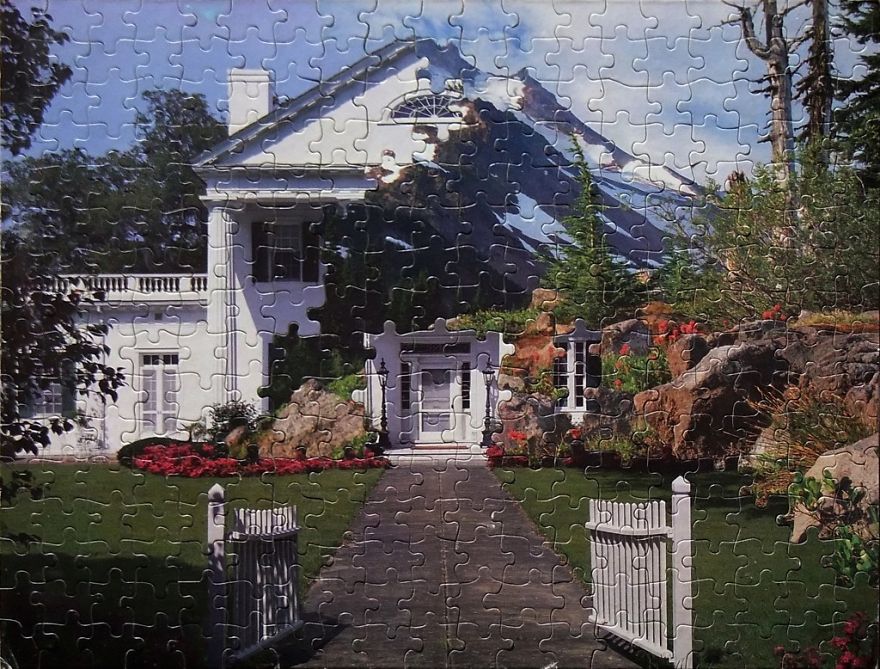
“This was the first puzzle montage I ever created, using pieces from two Golden Guild puzzles from the 1980s or ’90s. One puzzle showed the mansion at Orton Plantation, located in my boyhood hometown of Wilmington, North Carolina. The other puzzle showed Mt. Jefferson, near my current home in the Pacific Northwest.”
Image credits: Tim Klein
King of the Road
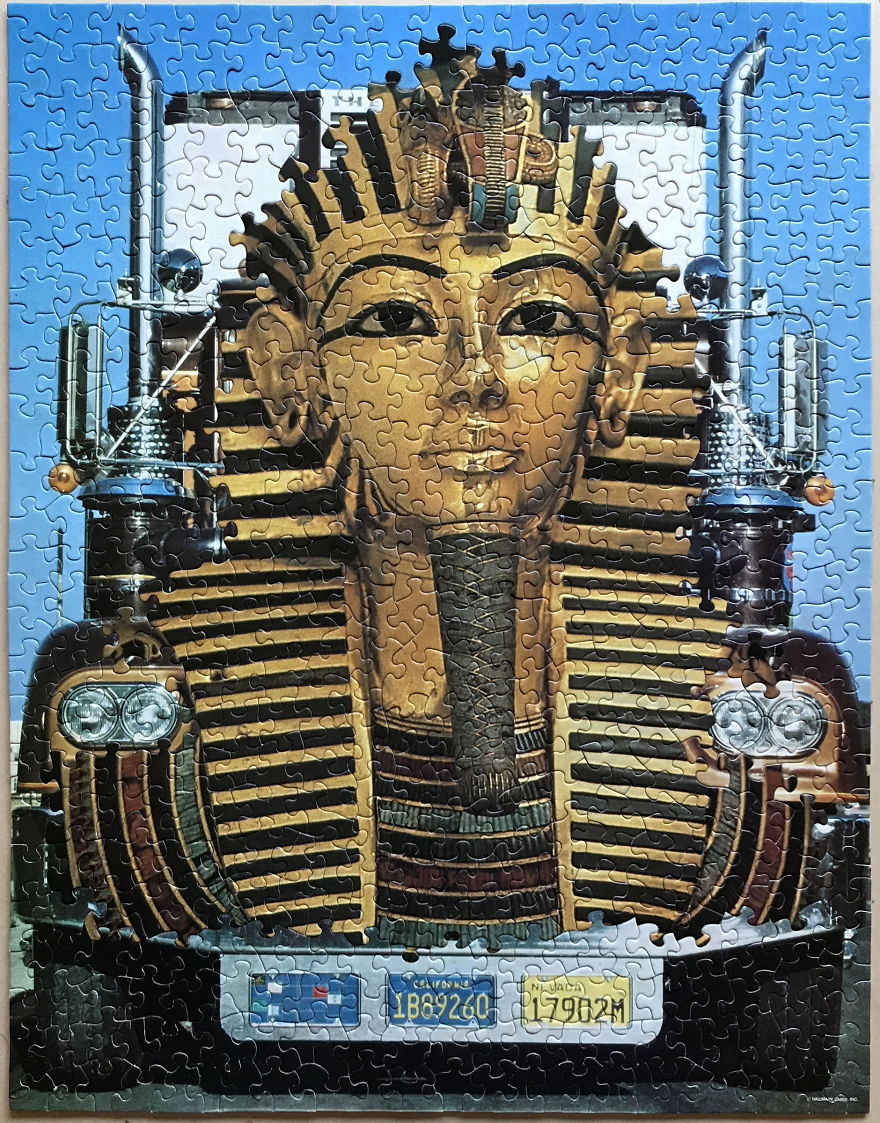
“Constructed from two Springbok puzzles from the 1970s.”
Image credits: Tim Klein
The Mercy-Go-Round (Sunshine and Shadow)
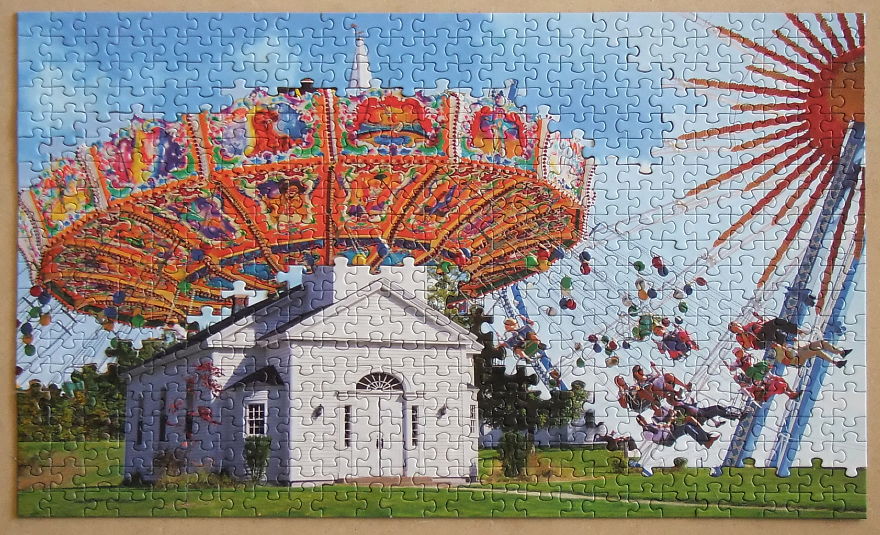
“I made this montage by combining a Puzzlebug-brand puzzle showing a church with another one showing a carnival ride. I’ve been a bit surprised at the wide range of reactions it gets. Some people find it humorous, others find it affirming or joyful, and others see it as blasphemous or insulting.”
Image credits: Tim Klein
Iron Horse
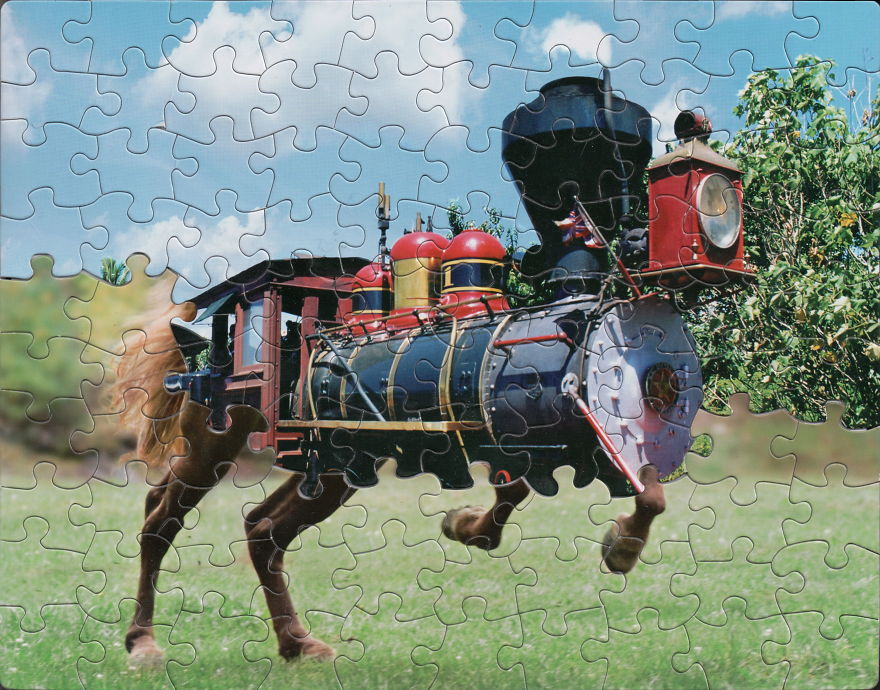
Image credits: Tim Klein
Waterfall Grille
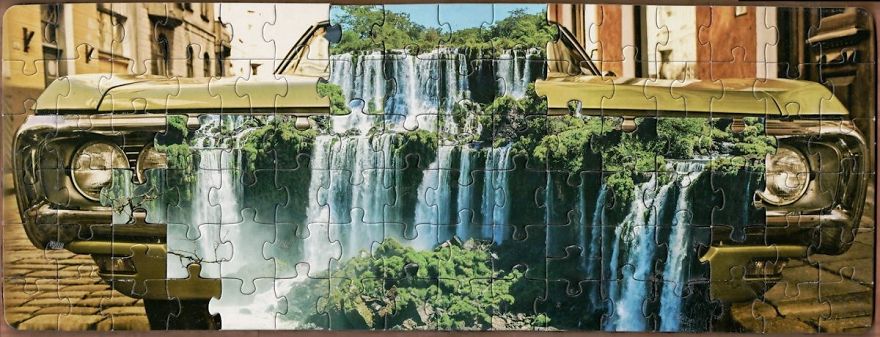
“Made from two small panoramic Perfect Fit brand puzzles”
Image credits: Tim Klein
Surrogate
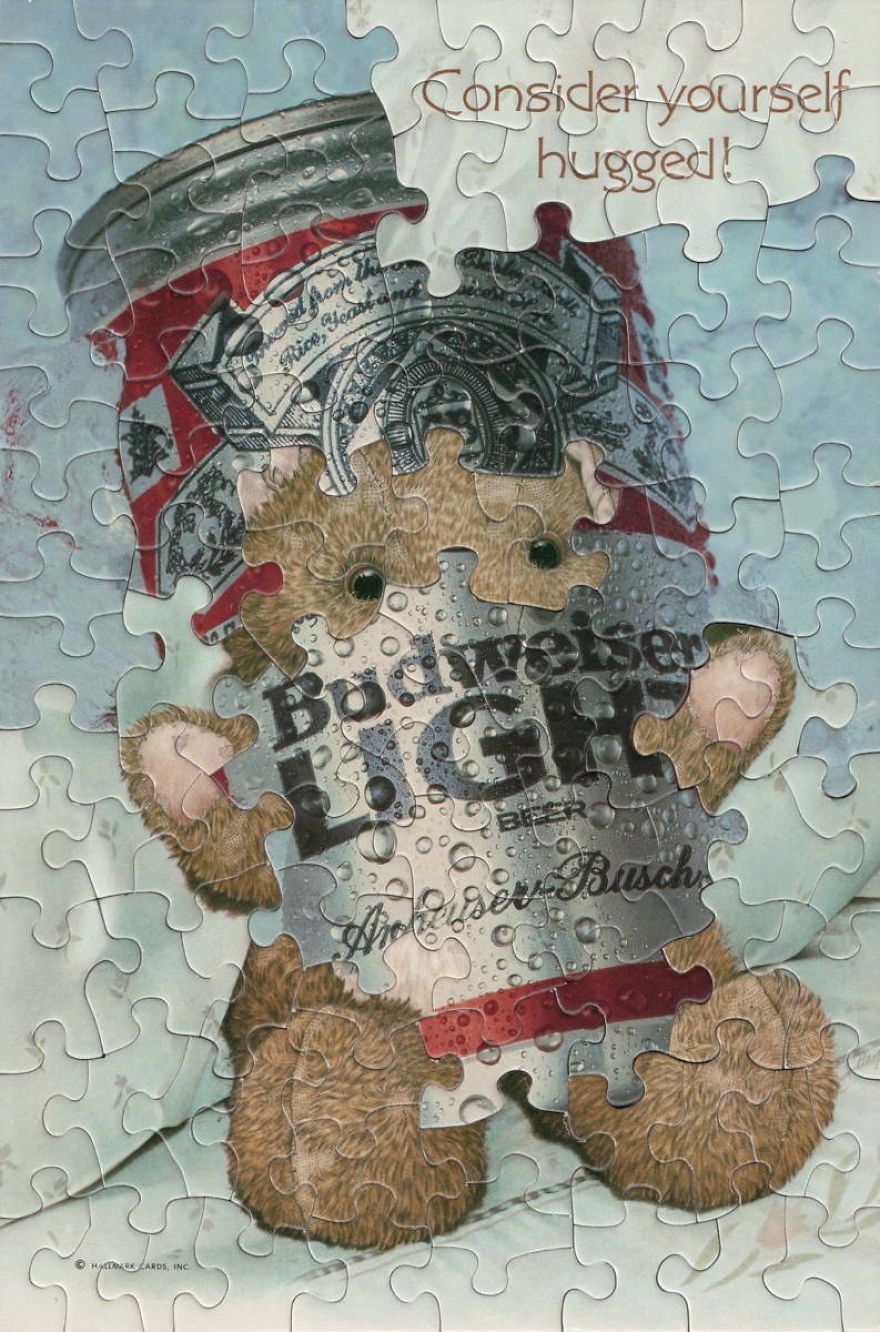
“Made from the pieces of two small Hallmark “greeting card” puzzles from the 1980s.”
Image credits: Tim Klein
The All-Seeing Elephant
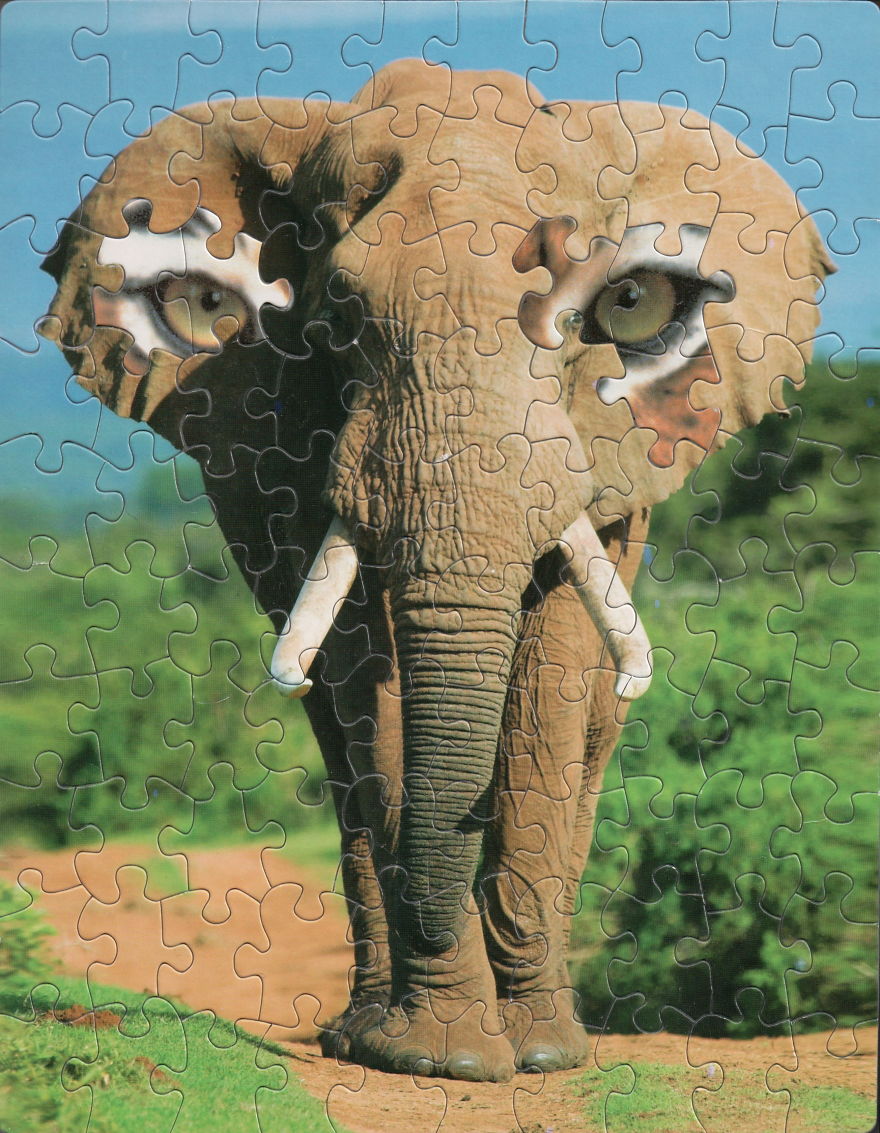
Image credits: Tim Klein
Metamorphosis (Unburdening)
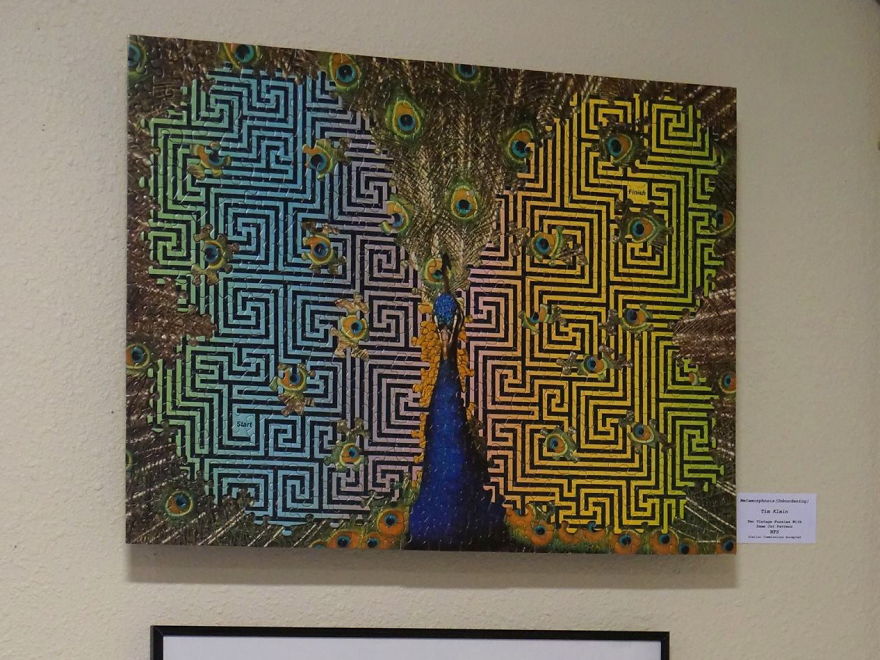
“Made from two Springbok puzzles from the early 1980s, one showing a peacock and another showing a maze. The “Start” and “Finish” points of the maze can be seen within the wings”
Image credits: Tim Klein
Metamorphosis (Enlightenment)
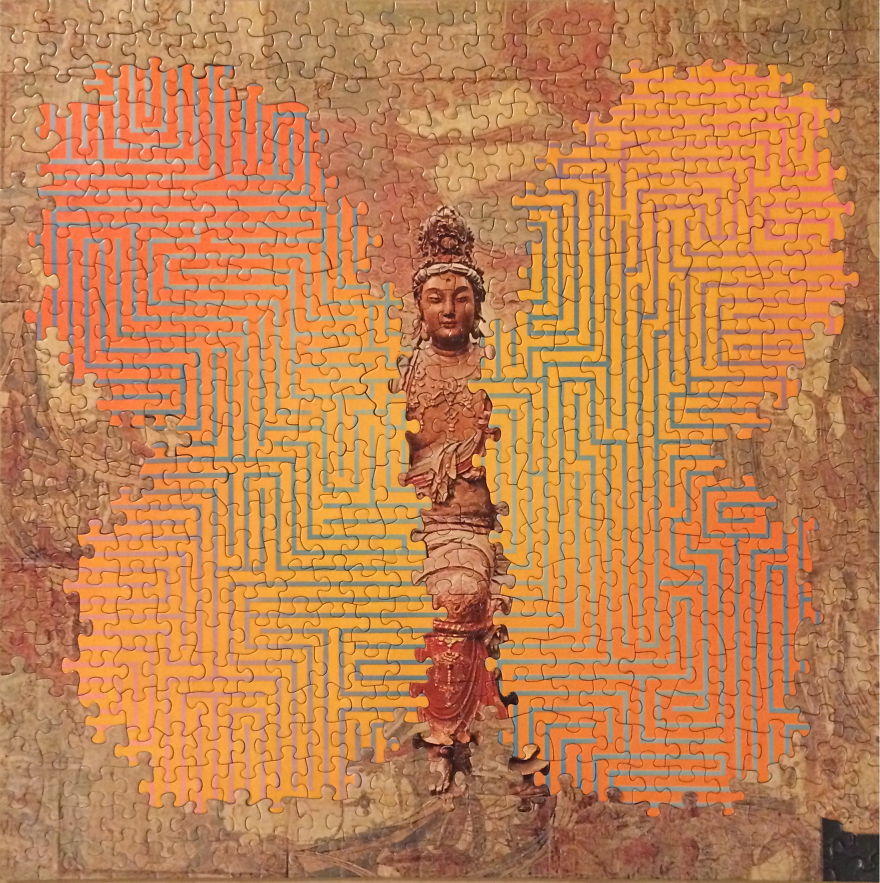
“I made this montage out of three square Springbok puzzles published in the early 1970s. One of the puzzles showed a maze. The others were two copies of the same puzzle, showing a large ancient Chinese statue of a bodhisattva named Kuan-Yin. (I’m told that a bodhisattva is loosely the Buddhist equivalent of a saint.)
In the original image, the statue rests on a dark rocky pedestal visible all along the bottom edge of the puzzle. I found that although my two copies of the Kuan-Yin puzzle shared the same cut pattern, they had been run through the die cutting machine at right angles to each other. This enabled me to eliminate the pedestal from the image by replacing one Kuan-Yin puzzle’s bottom edge with pieces from the left-hand edge of the other Kuan-Yin puzzle! Then, by swapping in pieces from the maze puzzle, I gave Kuan-Yin some butterfly wings. The subtitle “Enlightenment” refers not only to the Buddhist principle of enlightenment, but also to the fact that I’ve “lightened” a big heavy statue and given her flight.”
Image credits: Tim Klein
Convergence and Emergence (Shall We Dance?)
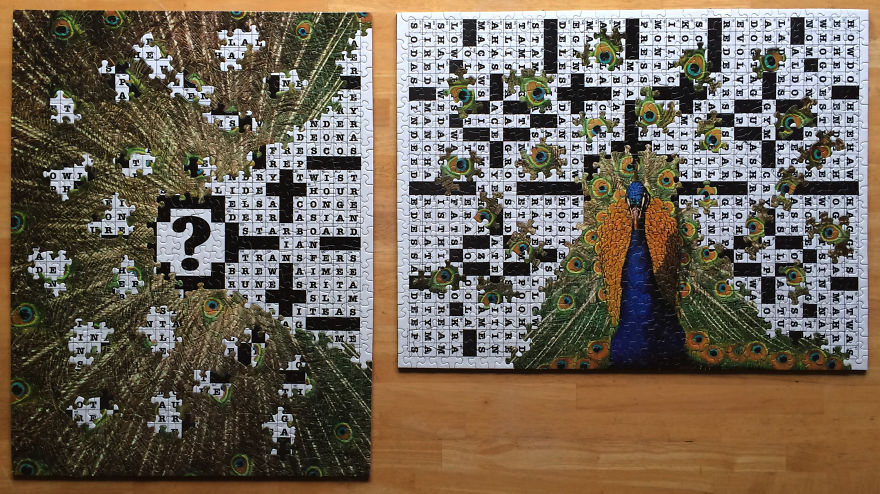
“A diptych made from two Springbok puzzles published in the early 1980s: one showing a peacock, and one showing the solution to a crossword puzzle with a “questions” theme. (The jigsaw puzzle came with a blank crossword puzzle on the box. Solving the crossword would help you complete the jigsaw, and vice versa.) The two halves of the diptych are inverses, each one using all the pieces not used in the other. Click the image above to see more detail.
The subtitle Shall We Dance? is taken from one of the crossword answers appearing in the right half, coupled with the question mark from the left half.
Each half has its own title. Left: Convergence (Neologism). Right: Emergence (The Words Made Flesh).
This made its debut at Gallery 360 in Vancouver, Washington, as part of an exhibit called “Opposites Attract”. Artists were invited to submit works depicting opposing forces in the world.”
Image credits: Tim Klein
The Other Side
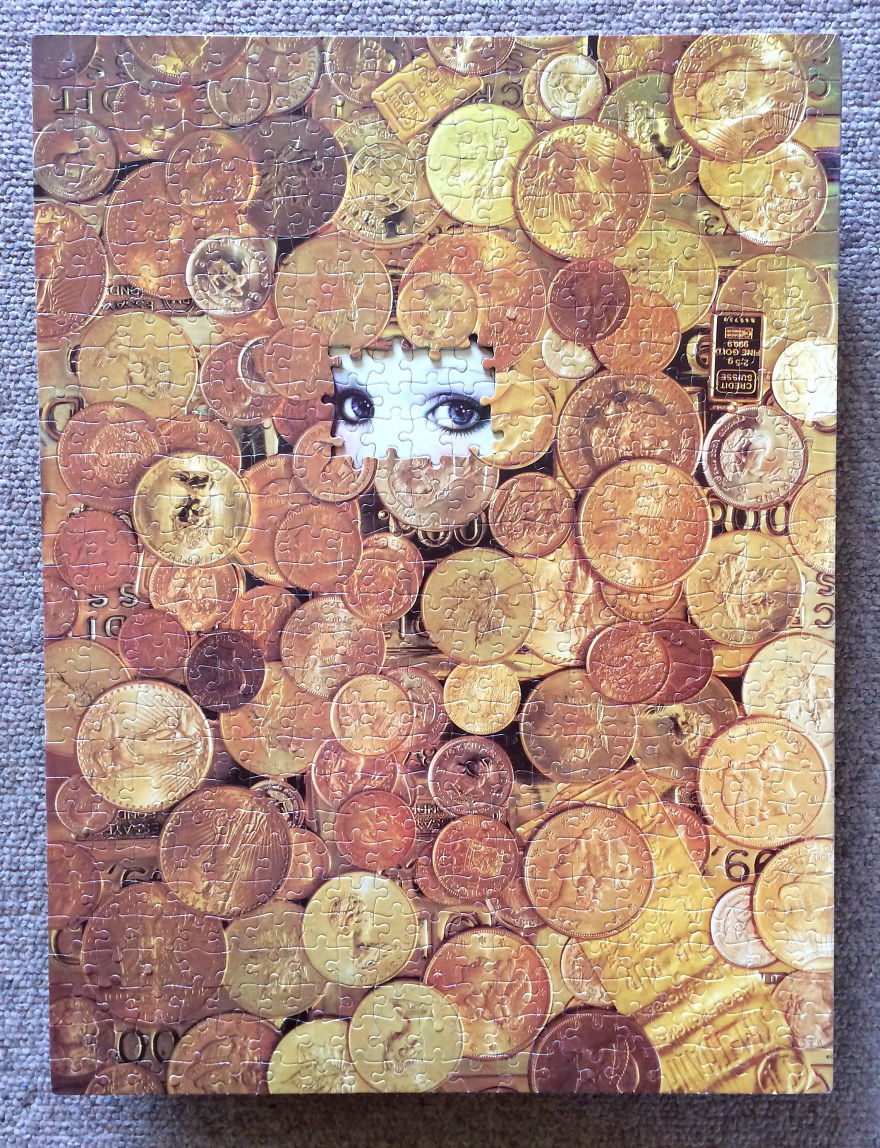
“Made from two American Publishing Company puzzles from the 1980s. Most of my puzzle montages are in a single plane, with pieces from the two source puzzles intermixed. But in this one, the coins puzzle is on top of the puzzle containing the eyes, resulting in a two-layered piece. Thus, the eyes look into the viewer’s eyes from the other side of a wall of gold”
Image credits: Tim Klein
Washington
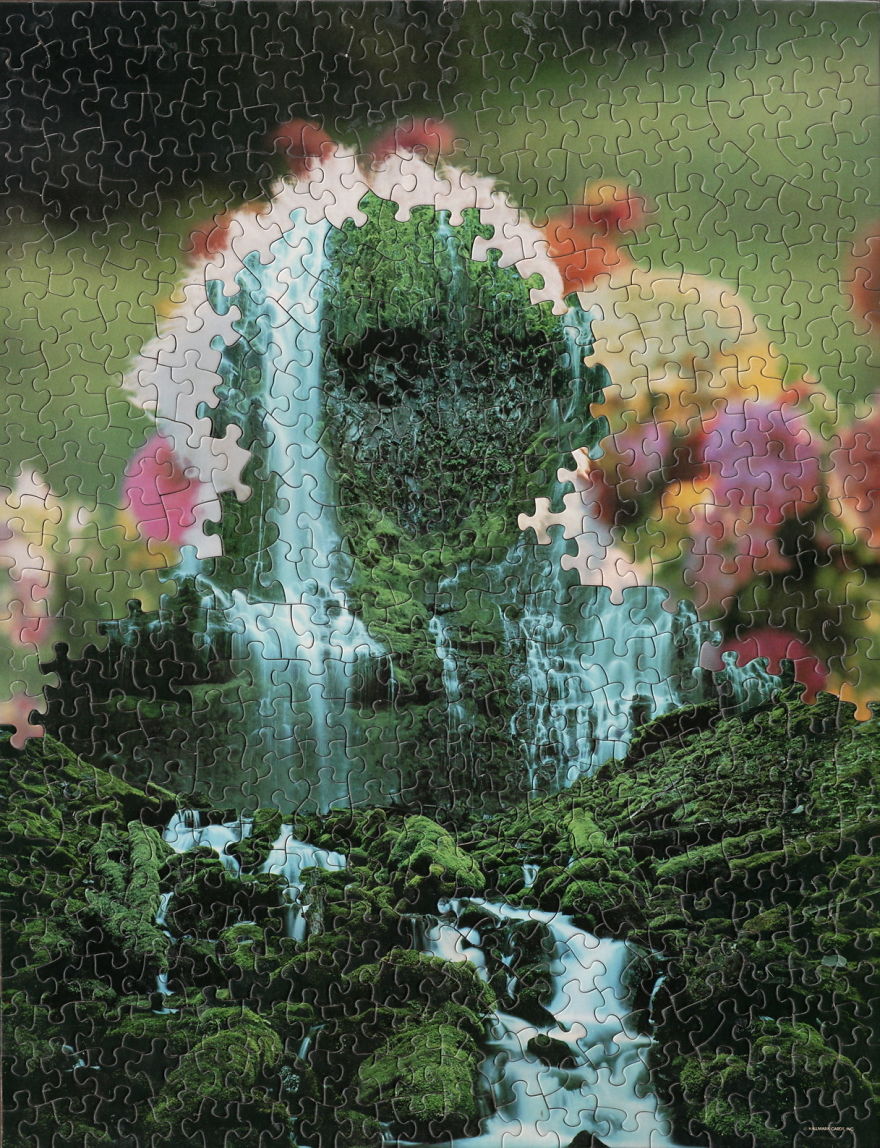
“A tribute to my mossy-rocked home state, and the man for whom it’s named. Made from two Springbok puzzles from 1979, one showing a Pacific Northwest waterfall, and one showing a fuzzy white puppy whose head happened to be shaped like a certain famous powdered wig.”
Image credits: Tim Klein
Sphinx
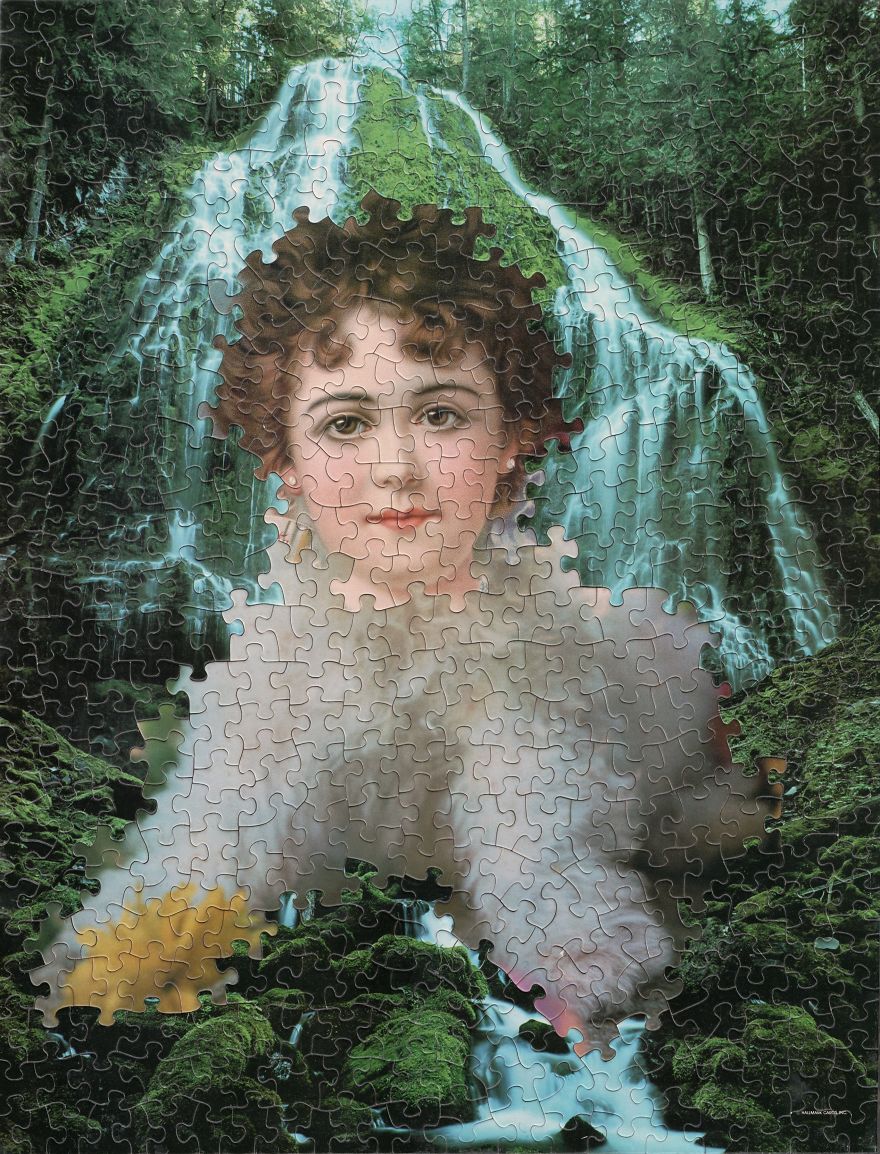
“Made from three Springbok puzzles published in the late 1970s and early 1980s: one showing a waterfall, one showing a puppy, and one showing a late 19th century Coca-Cola advertisement.”
Image credits: Tim Klein
Soda Pup
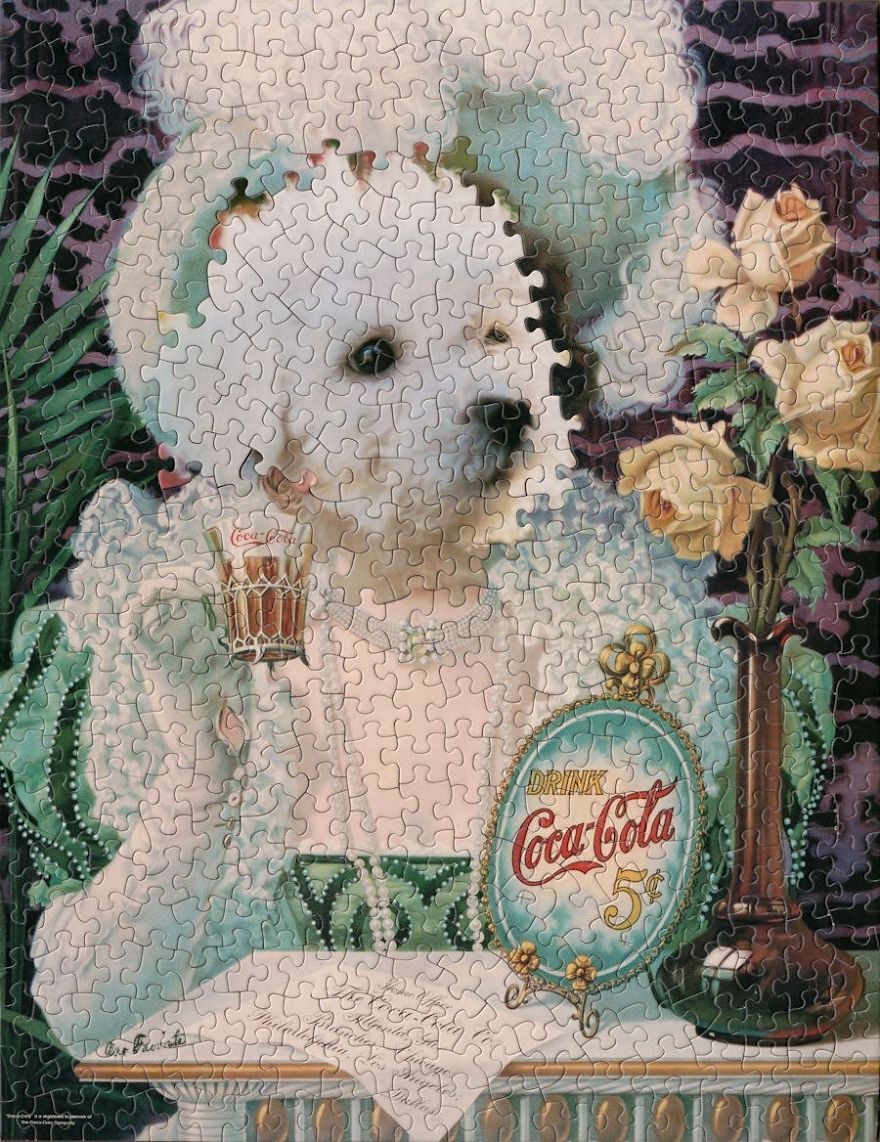
“Made from two Springbok puzzles from 1979 and 1980.”
Image credits: Tim Klein
To Make Much of Time (Gather Ye Rosebuds While Ye May)
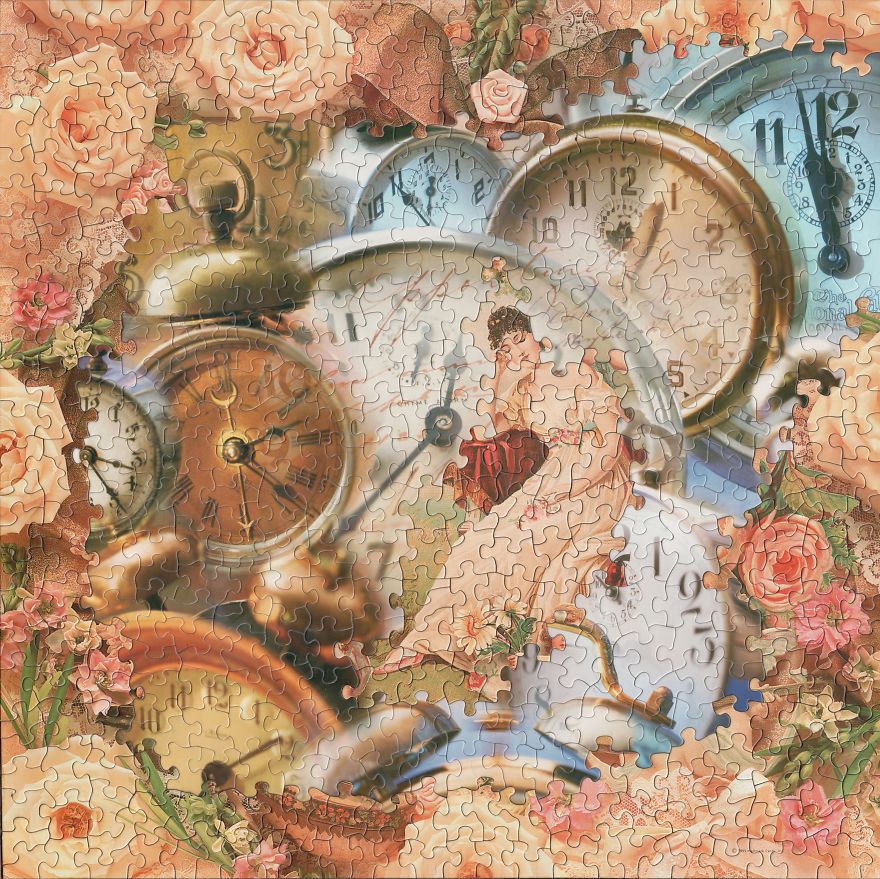
“Constructed from two Springbok puzzles from the 1990s, one showing a collection of clocks, and another showing Victorian ephemera. I like the way the central clock’s hands from the first puzzle happen to parallel the posture of the maiden from the second puzzle. The title is a reference to the 17th century poem “To the Virgins, To Make Much of Time” by Robert Herrick, and the subtitle is the poem’s famous first line.”
Image credits: Tim Klein
Daisy Bindi
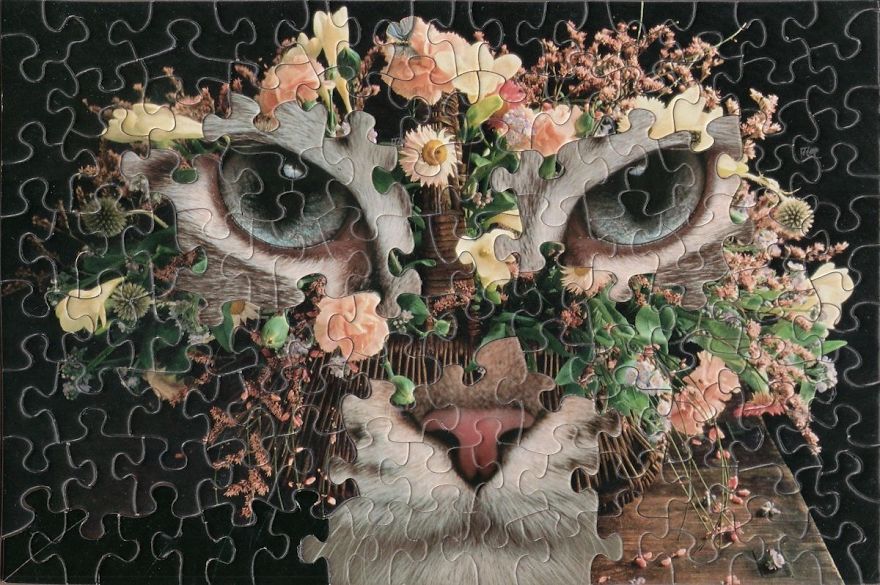
“Made from the pieces of two small Springbok puzzles published in 1987, one showing a cat and one showing a basket of flowers.”
Image credits: Tim Klein
Schools (Fishing For Answers)
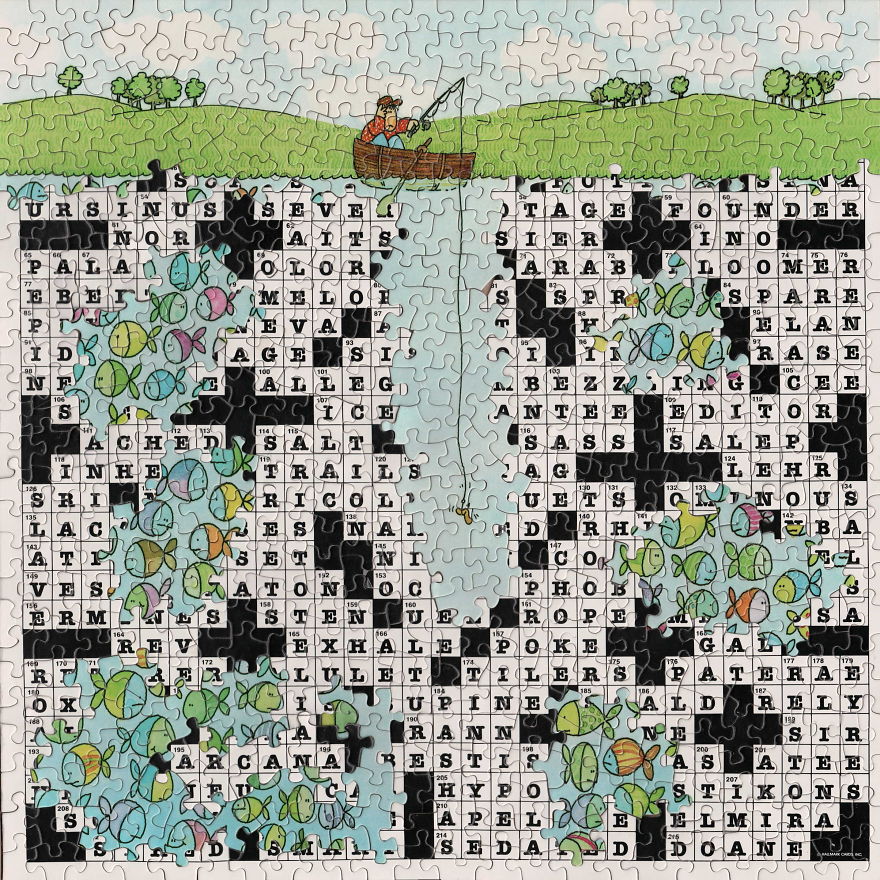
“Made using pieces from two Hallmark puzzles from the 1970s, one showing a comically unsuccessful fisherman, and the other showing the answers to a blank crossword puzzle that was printed on the box.
I like the fact that the school at the lower left has “arcana” at its core. (Aristotelian arcana, no less!)”
Image credits: Tim Klein
Pareidolia
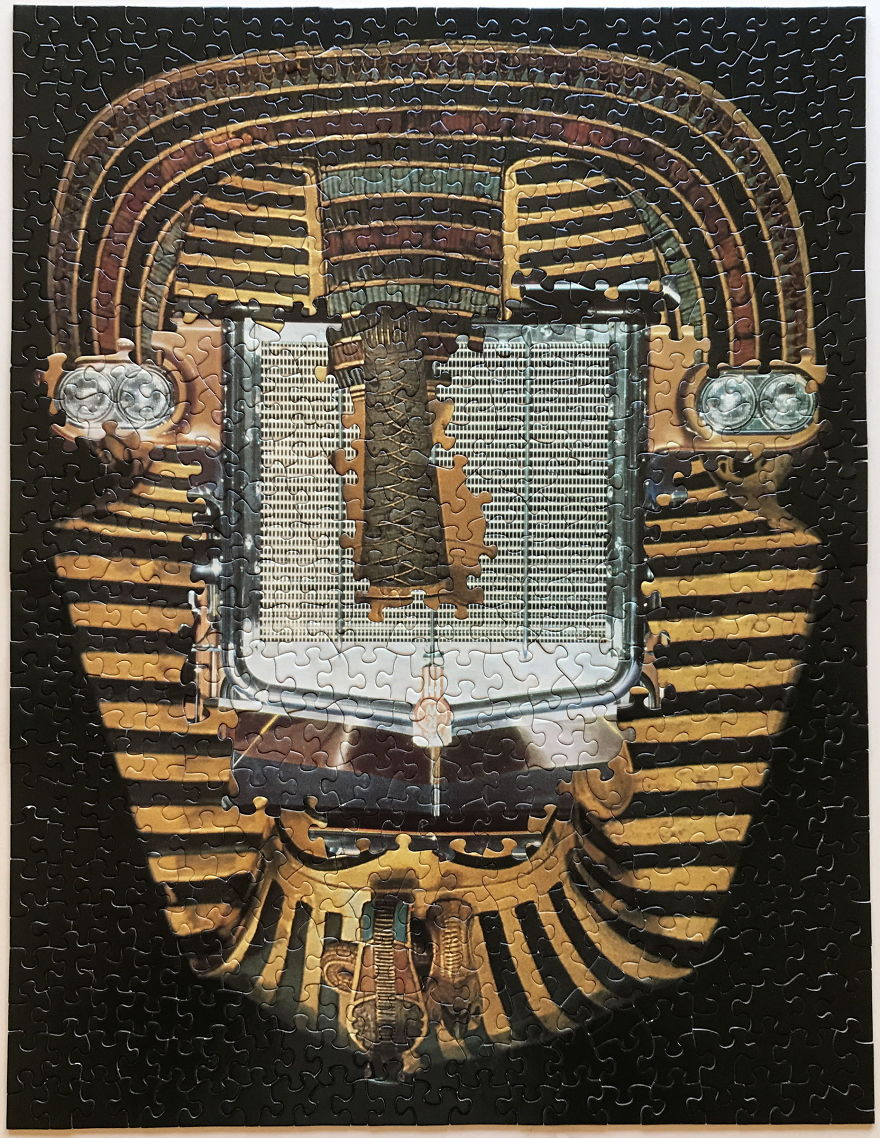
“I constructed this montage from the same two 1970s Springbok puzzles that I used in King of the Road, one showing the burial mask of King Tutankhamun, and the other showing a truck.
The title Pareidolia is a wonderful word that refers to the psychological phenomenon of perceiving faces or other patterns where there are none.”
Image credits: Tim Klein
White Elephant (Present and Future)
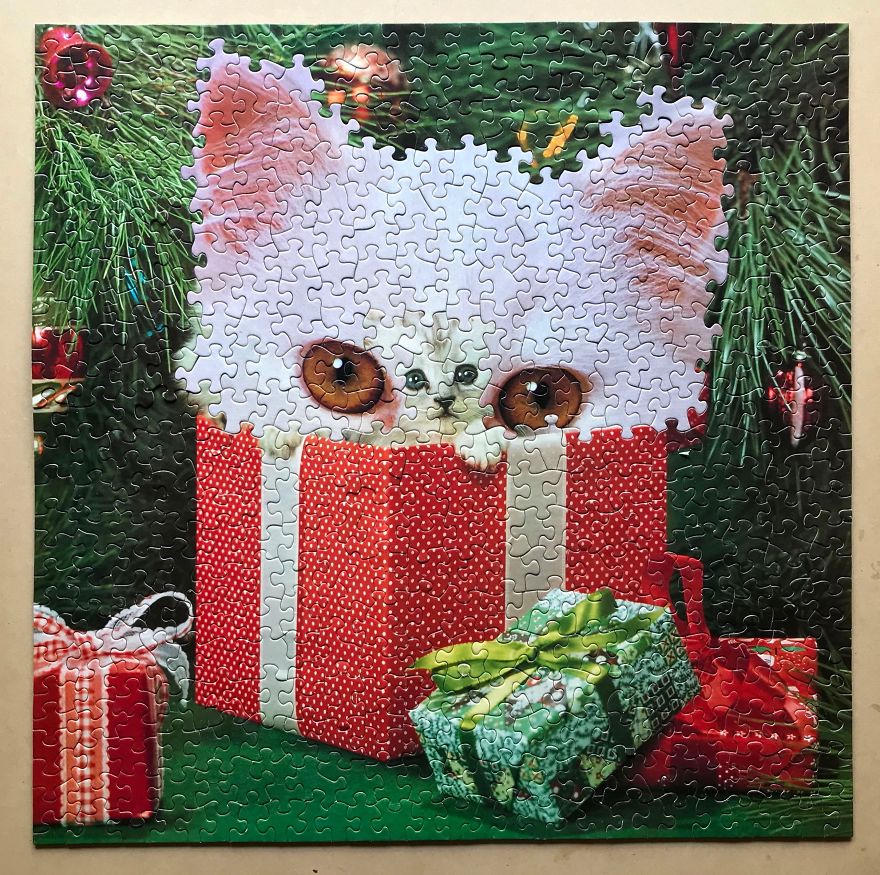
“Made from pieces of two Springbok puzzles published in 1978 and 1980.”
Image credits: Tim Klein
Thaw (Warm Breath on a Winter Window)
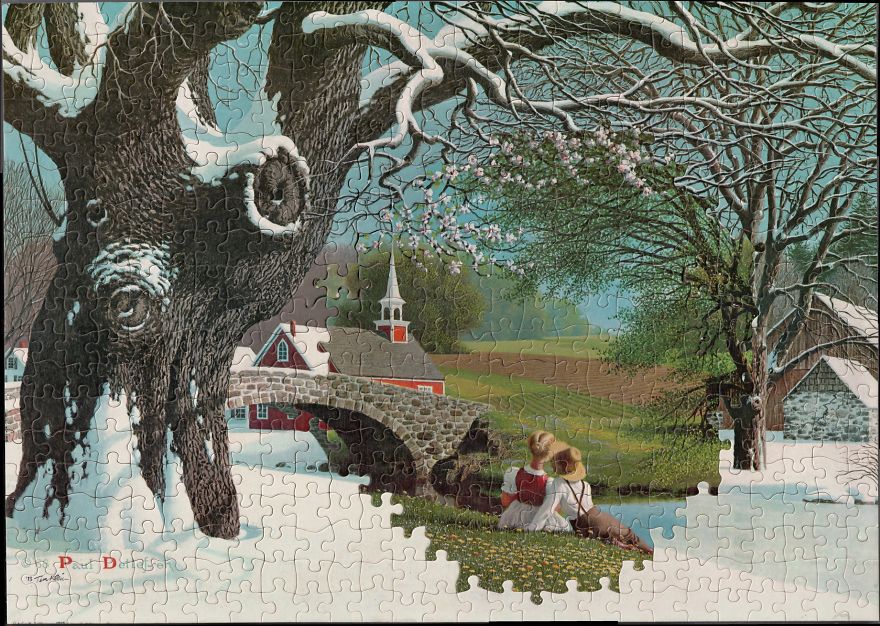
“Perhaps this montage was too easy! After all, the pieces came from two puzzles showing the same scene. They were Milton Bradley puzzles from the late 1960s, taken from a set of “four seasons” paintings by Paul Detlefsen. (When I show this one in public, I credit it to “Tim Klein, after Paul Detlefsen”.) At the bottom of the “thawed” circle, where green spring meets white winter, the curvature of the puzzle pieces gives a nice melting effect. It’s as if you, seeing the winter scene through a window, have breathed upon the glass and magically revealed a glimpse of the warm spring to come”
Image credits: Tim Klein
Prey
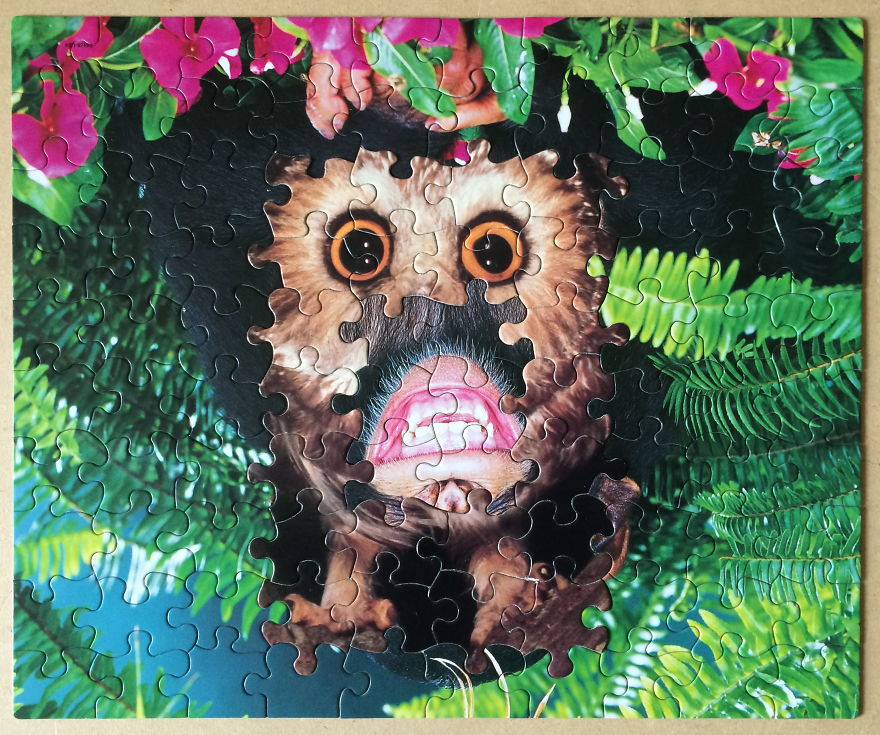
“Made from two Milton Bradley puzzles that had the same cut pattern, but had been run through the cutting machine rotated 180 degrees with respect to each other.
This piece made its debut at Gallery 360 in Vancouver, Washington, as part of an exhibit called “Show Some Emotion”. Most of the other artists’ works depicted lovers holding hands, children playing with puppies, etc. And then there was this one. I was the only artist who chose to represent the emotion “mortal terror”.”
Image credits: Tim Klein
How the West Was Won
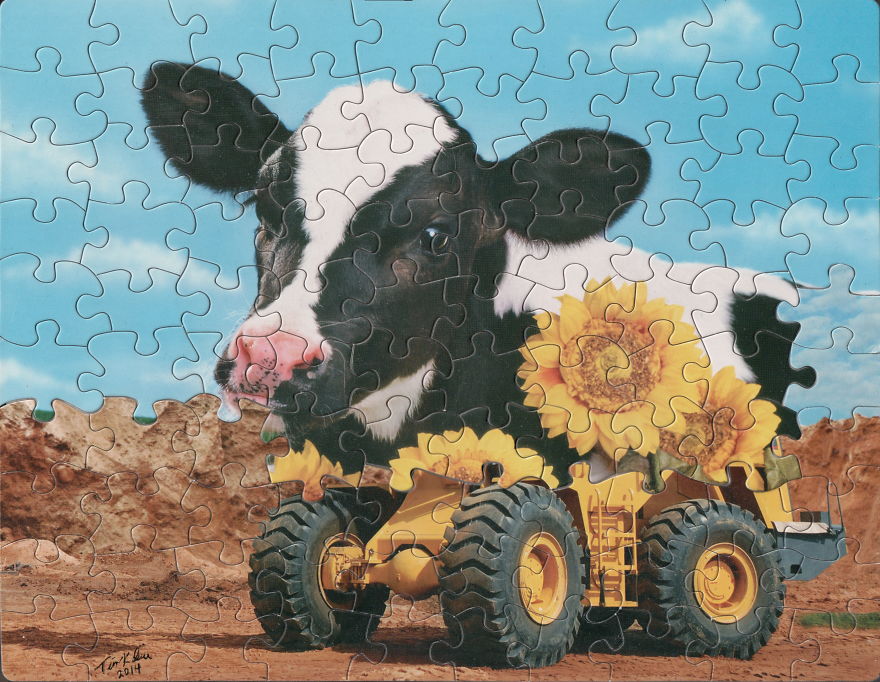
Image credits: Tim Klein
Were-Rabbit
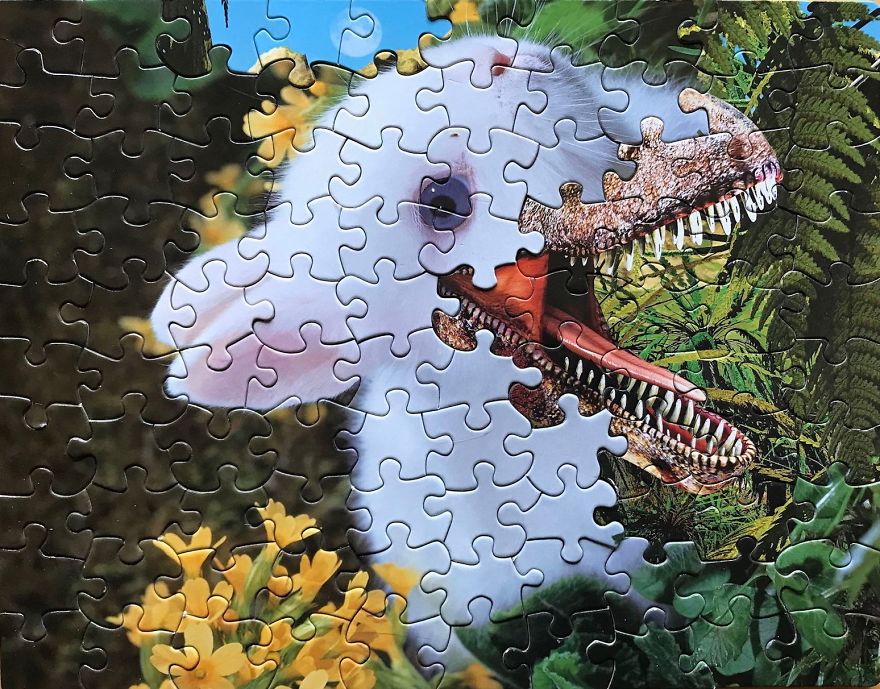
“Made from the pieces of two small Puzzlebug brand puzzles, one showing a bunny and one showing a dinosaur under a full moon”
Image credits: Tim Klein
World Citizen
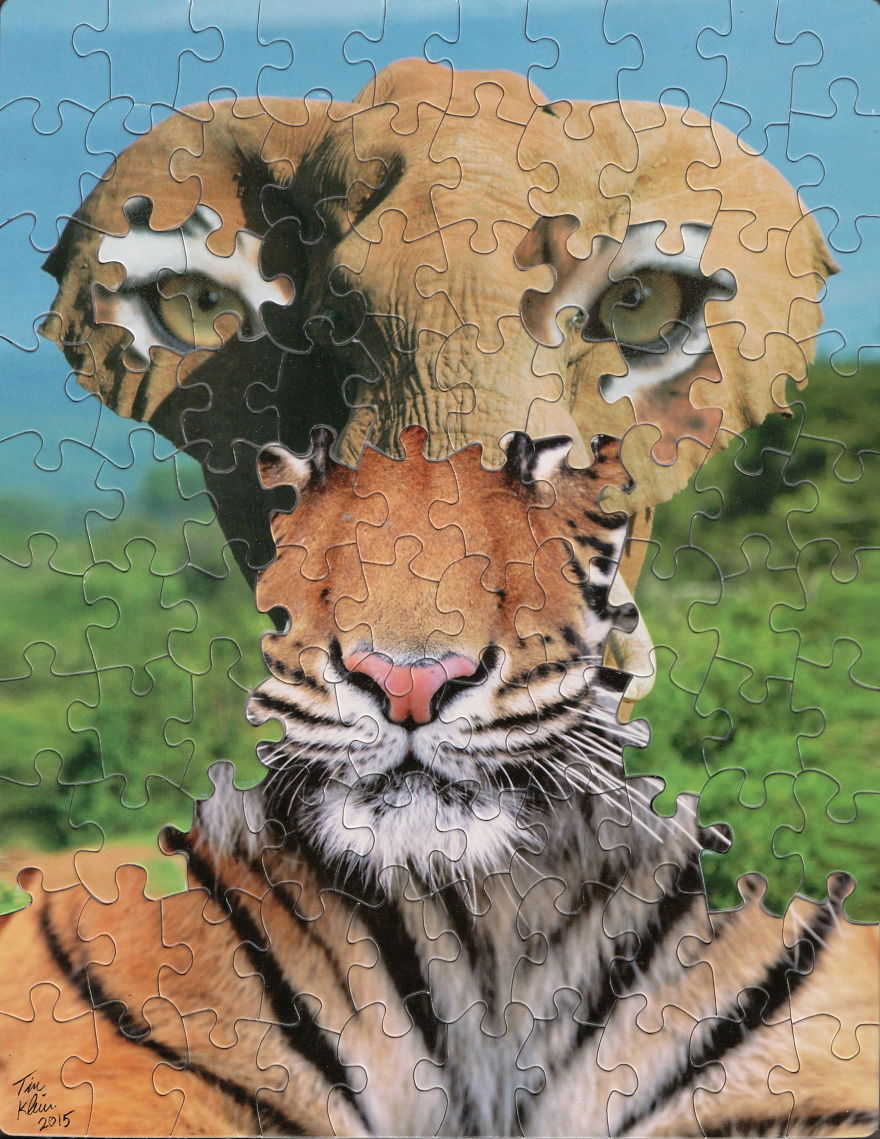
Image credits: Tim Klein
Bow Wow
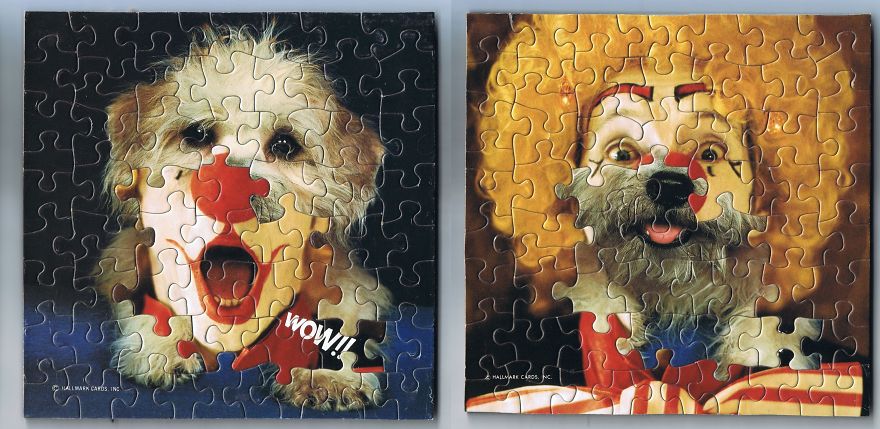
“A diptych made from two miniature Springbok puzzles published in the 1980s, one showing a dog and one showing a clown saying “Wow!!” The two halves are inverses, each one using all the pieces not used in the other.
This pair debuted at the Splendorporium gallery in Portland, Oregon, as part of a circus-themed exhibit”
Image credits: Tim Klein
A Modest Proposal for the Increase of Attendance at Classical Music Concerts
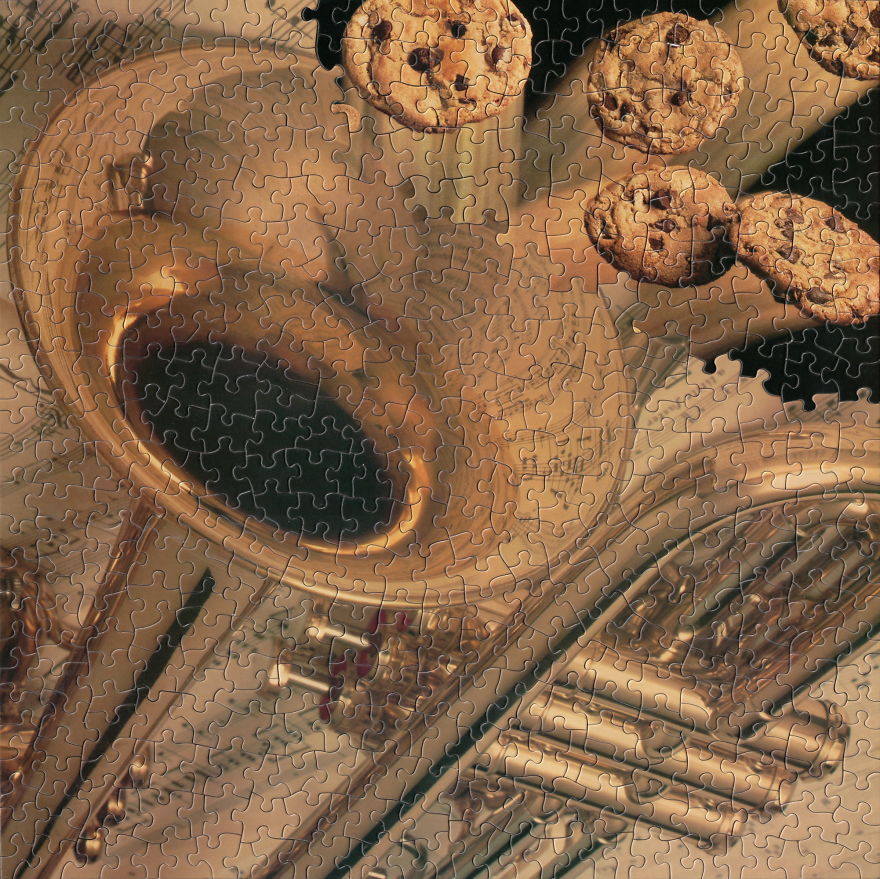
“Made from two Springbok puzzles from the 1980s, one showing a horn and one showing cookies magically flying out of a cookie jar.”
Image credits: Tim Klein
The Dance of the Bathroom Cleaning Fairies
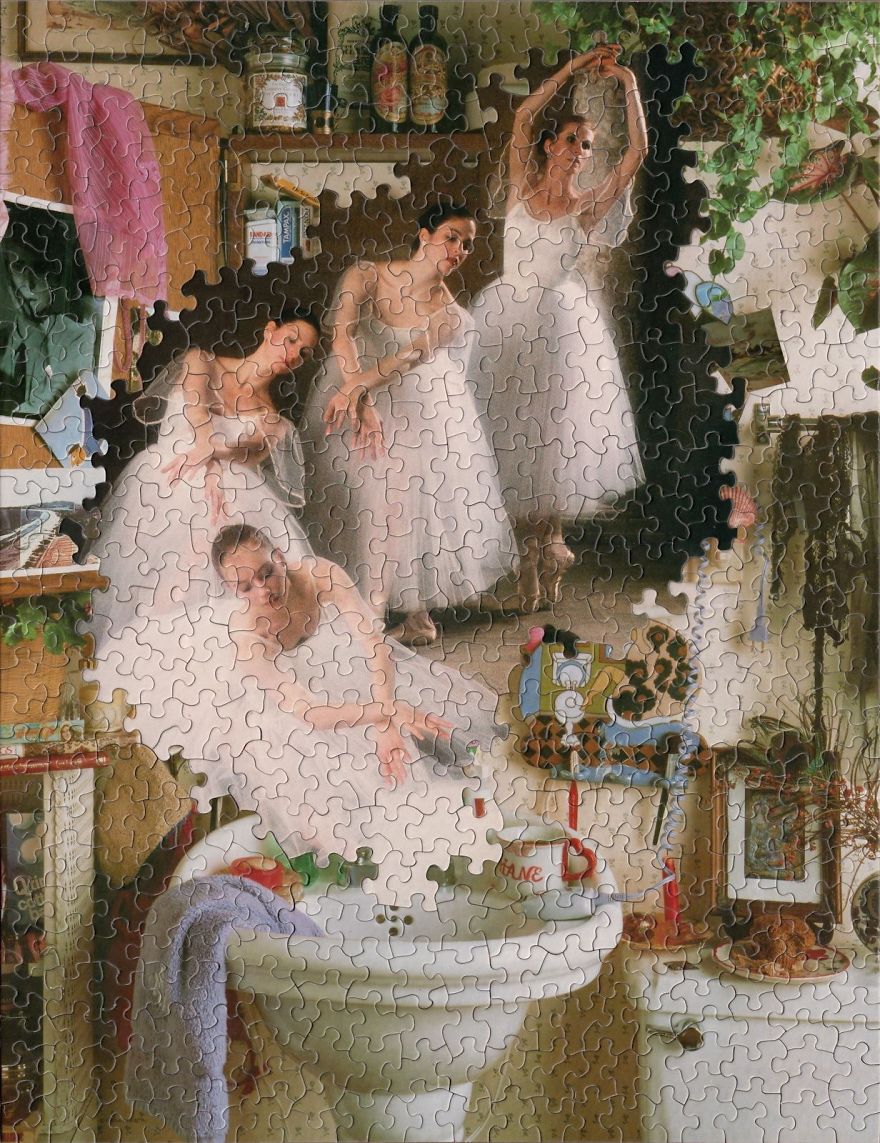
“Made from two Springbok puzzles published in the 1980s.”
Image credits: Tim Klein
Pig Jaw Suzzle #1
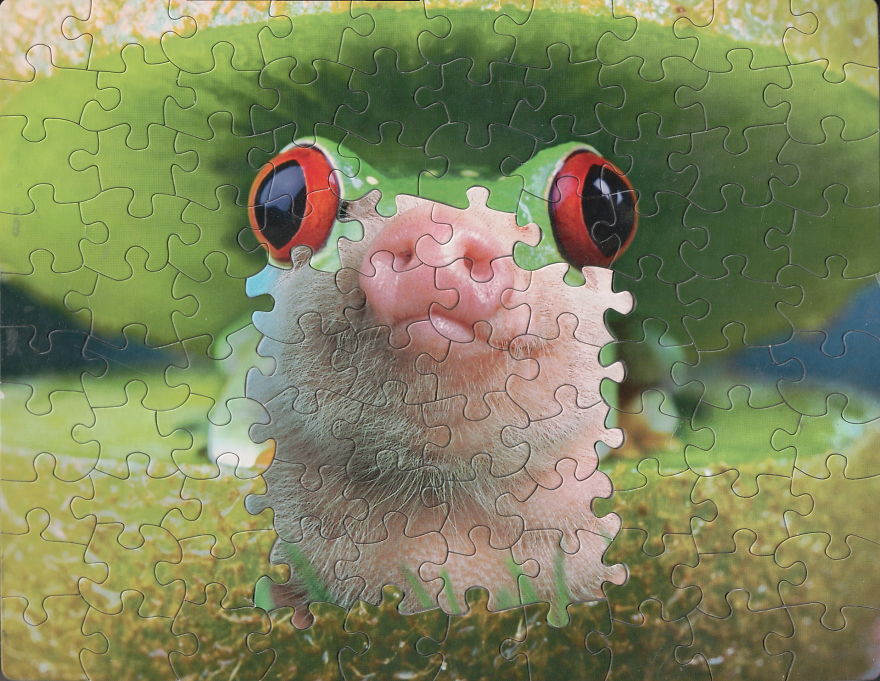
Image credits: Tim Klein
Pig Jaw Suzzle #2
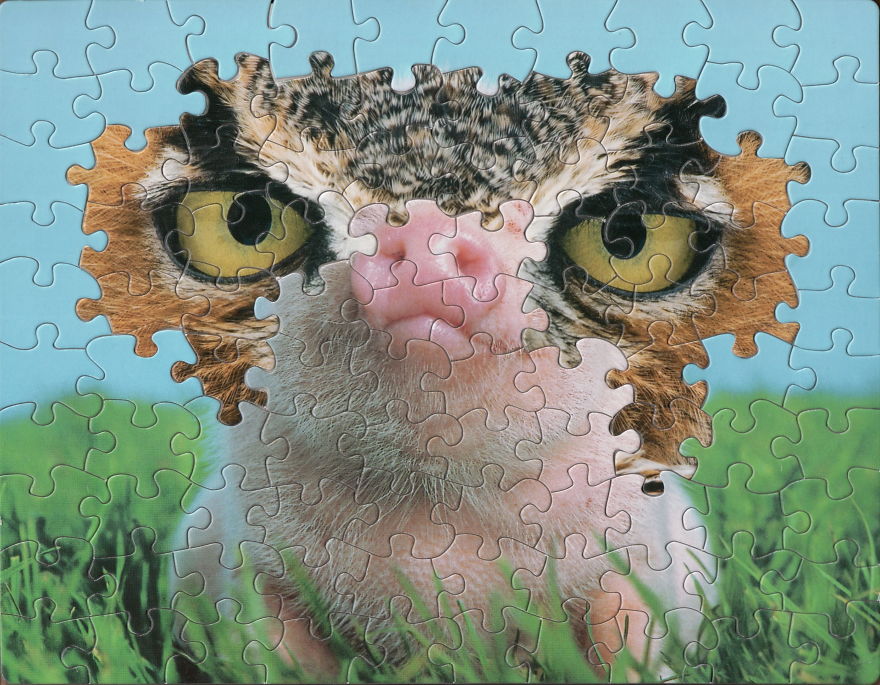
Image credits: Tim Klein
T’ rainosaurus Rex
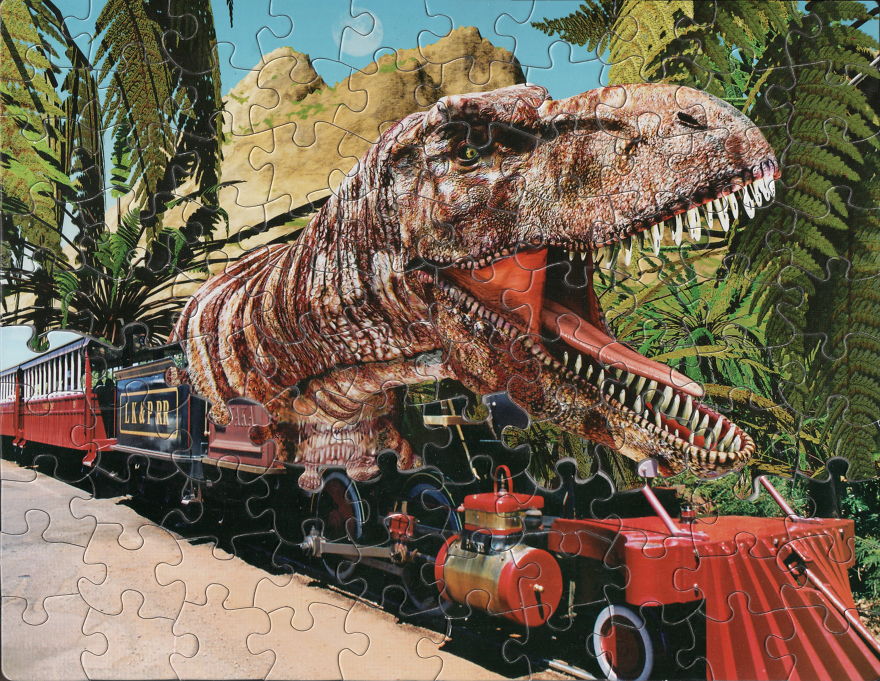
Image credits: Tim Klein
Mirage
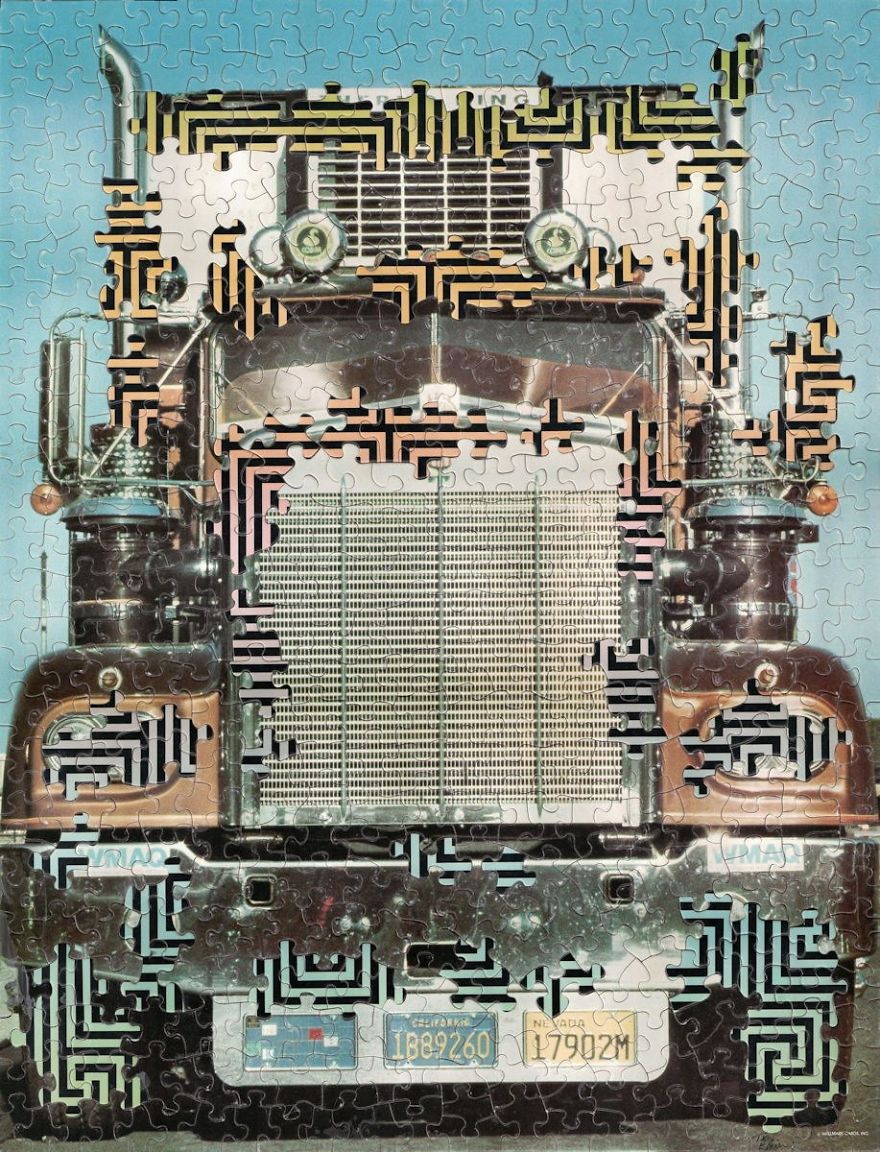
“Made from two Springbok puzzles from the 1970s, one showing a truck and one showing a maze”
Image credits: Tim Klein
The Last Night, by Leonardo da Vincent
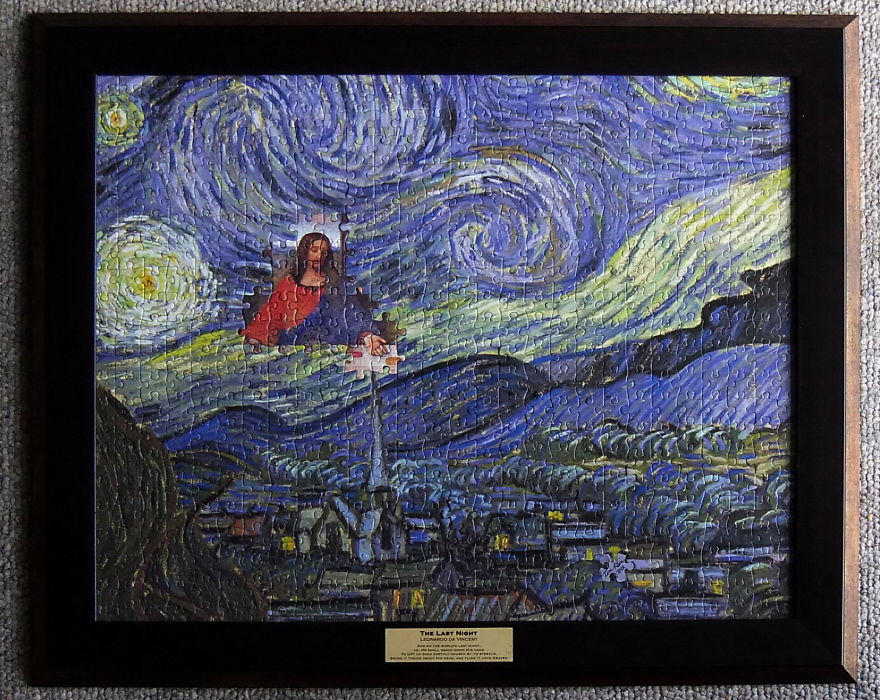
“Made from two puzzles published by Buffalo Games, one showing The Last Supper by Leonardo da Vinci, and one showing Starry Night by Vincent Van Gogh. The title is an amalgam of the two original paintings’ titles and the names of the two artists. I normally prefer to float-mount my puzzle artworks rather than frame them, but in this case I needed a frame so I could attach a plaque with a caption in very tiny lettering”
Image credits: Tim Klein
Timekeeper

“Made from two small puzzles in a series called Tower Puzzles, published by Greenbrier International.”
Image credits: Tim Klein
Source: BoredPanda
